
Most Read

Beware of Magazine Subscription Scams Asking for Payment

5 Ways to Avoid Magazine Subscription Scams & How to Subscribe Safely
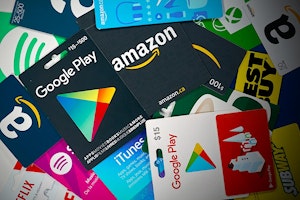
How Do You Beat Gift Card Scams? Never Pay Using Gift Cards

Founder of Cancer Cure Scheme Arrested on $700,000 Fraud

How to Tell if Nikes Are Fakes: From Tags to the Stitching
Bills & Invoices In Depth
- What Are Billing and Invoice Scams?
- Red Flags of Invoice and Bill Scams
- Most Common Types of Billing & Invoice Scams
- How to Beat Billing & Invoice Scams
- Fallen Victim to a Billing & Invoice Scam?
Billing and invoice scams can be particularly tricky to deal with, as they involve one of the most common and important transactions we’re likely to make. Still, there are ways to try to detect these deceptions and a few options to pursue if you think you’re the victim of fake invoices or bill scams.
What Are Billing and Invoice Scams?
“Billing and invoice scams” is a catchall term for a broad category of scams. But essentially, these plots will all target the billing process, attempting to extract money or sensitive information out of businesses or individuals who don’t actually owe anything.
If you run a business, you might receive a message with an invoice attached, supposedly sent for anything from a website domain name extension to advertising services. If you’re an individual, you may encounter a billing scam from the other side, getting a fake invoice from what appears to be a trusted company, supposedly to cover the cost of delivery, order, or even local tax or fee. Any funds sent, however, will go straight to a scammer.
Billing scams are also popular on online marketplaces like Craigslist or eBay, where scammers use fake invoices to “prove” they paid for a product when that’s not the case.
And some scammers are after more than money, using fake invoice attachments as ways to download malware onto your device and steal personal information that may help them steal your identity.
Unfortunately, as options for virtual payments have expanded—including through websites like PayPal and apps like Venmo—so have the number and type of billing and invoice scams. Even small local businesses are no longer immune to the deception.
Source: Best Accounting SoftwareA 2020 report found that companies lose an average of 5% of revenue each year on billing scams, totaling a staggering $4.5 trillion in losses worldwide, while a 2019 investigation reported that nearly 81% of organizations will be targeted by such deceptions.
Red Flags of Invoice and Bill Scams
Invoice and billing scams can take many different forms, but there are still a few common red flags you can look out for that may tip you off to a problem, including:
- Invoices with rounded amounts, e.g. $1,500 vs. $1,439.27.
- Bills for work that was not ordered or performed.
- Abnormal volume of invoices from a particular vendor.
- Invoices for vague or intangible services.
- Typos or grammatical errors.
- Mathematical errors.
- Missing details, such as taxes or fees, or mismatching details, such as account numbers.
- Vendors with mail drops as their official address.
- Invoices for amounts that are just below a sanctioned approval amount for a service.
- More likely the case when the scammer works for the company.
If you’re an individual receiving a bill or invoice from what appears to be a trusted company or financial institution, make sure to also look out for:
- Email addresses. Do they match the company’s official domain?
- Never click on them—instead type the company’s website directly into a new browser.
- Brand details, including specific logos, fonts, and colors. Do they match the company’s?
Most Common Types of Billing & Invoice Scams
Since nearly every industry involves billing and invoicing, and nearly every industry today can and does handle those tasks online, there are several ways these scams can manifest.
Billing scams and fake invoices can come from outside or within a company. They can also target businesses or individuals. And, as with all deceptions, scammers are constantly tweaking the formula in hopes of finding new victims.
Fake Invoice Phishing Scams
Fake invoice phishing scams combine the fake bill scheme with a phishing plot, that helps a scammer extract sensitive information which may allow them to steal your identity.
With these deceptions, scammers often send the “invoice” as an email attachment. Once clicked on, the attachment will download malware onto your device, which can give scammers access to your machines.
Duplicate or Fake Invoices
A common deception that can come from inside or outside a company, duplicate, and fake invoices are some of the most common versions of this scam.
With duplicate invoices, scammers bill a company twice for the same task, hoping either that no one will notice or attempting to explain away the situation or convince a company the first funds didn’t go through.
Fake invoices are exactly as they sound—bills that are completely made up, for work that was never ordered or performed. Once again, scammers bank on a company not bothering to follow up on whether the claim is legitimate.
Shell Companies
More often than not, these types of bill scams come from within a company.
Typically, these deceptions work when a company is billed with a fake invoice. The bills come from a fake company the scammer has created, and the funds they receive are transferred into accounts held by these shell companies.
Non-Delivery for Product or Services
More like a simple hit and run.
These scams happen when a company is billed by a vendor for a product or service, then, instead of delivering that product or service, the scammer instead runs off with the money, never to return.
Online Marketplace Bill Scams
On the flip side of the non-delivery fake invoice scam is the online marketplace bill scam.
This can happen when you’re selling something on common websites like Craigslist, Facebook Marketplace, or eBay. A scammer will “purchase” your product, and send you a fake invoice as proof of their payment. Of course, the bill will be a photoshopped fake, but you’ll unfortunately not figure that out until you’ve already shipped out the item.
Vendor Impersonation
A step up from the fake invoice scam, these deceptions involve scammers impersonating actual vendors a company may work with.
Depending on the scammer’s amount of inside knowledge, they may even submit bills for work a real company has actually done for their client, making the scam that much harder to detect.
CEO Fraud
A different type of impersonation, this plot involves scammers presenting themselves as a company’s chief, and ordering “emergency” or urgent payments for certain services.
The fraud emails will direct their recipients to send money to a scam account.
How to Beat Billing & Invoice Scams
Billing and invoice scams are especially insidious, as they can just as often come from within a company as from outside of it. To that end, when it comes to beating these types of scams, knowledge is power, and a little preparation can go a long way.
When working for a company, you can look out for invoice scams by:
- Verifying the existence of any unfamiliar vendor (company or individual) before paying them.
- Checking incoming invoices against work orders.
- Researching any potential vendors through the Better Business Bureau or similar databases.
- Conducting unscheduled audits.
- Flagging potentially suspicious invoices.
And if you’re an individual receiving an invoice through email, make sure to:
- Double-check the invoice is actually for something you ordered.
- Check the email address—does it match the company’s domain?
- Double-check all other details: Account numbers, credit card numbers, etc, to see if they match.
- Never provide any personal information, including PINs and passwords, bank account and credit card numbers, or personal details.
- Never open any attachments from someone you don’t know.
- Never click on any links in emails or texts. Instead, type a company’s website directly into a new browser.
Fallen Victim to a Billing & Invoice Scam?
If you think you’re the victim of a billing and invoice scam, there are still a few things you can do.
If you work for a company you believe is being scammed, you can:
- File a report with the Federal Trade Commission.
- Hire a lawyer or use the company’s lawyers to investigate further.
- Report any phishing emails to [email protected].
If you’re an individual, and you think you got scammed, you should:
- Contact your bank and credit card companies to cancel the payment, if possible.
- Block, flag, or report the scammer through the website or app you were using, if applicable.
- Follow up with the website or app’s customer service team, if applicable.
- File a report with the Federal Trade Commission (FTC).
- Contact the local authorities.
If you think you were the victim of an invoice phishing scam, there are a few other precautions you should take, including:
- Freeze any accounts connected to the website in question.
- Contact your bank and credit card companies about the incident.
- Cancel your current credit and debit cards and open new ones.
- Change your passwords and PIN numbers.
- Report the incident to:
- The Federal Trade Commission (FTC).
- The Department of Justice’s National Center for Disaster Fraud.
- The Internet Crime Complaint Center (IC3).
- Possibly create an IRS Identity Protection PIN.
Scams Relating to Bills & Invoices

Beware of Magazine Subscription Scams Asking for Payment
Scammers are tricking people into thinking they're paying for subscriptions they don't want, in an attempt to steal your information and money.

How Do You Beat Gift Card Scams? Never Pay Using Gift Cards
Beating this scam is simple—don't pay for anything using gift cards and don't give anyone you don't know or trust your gift card information.
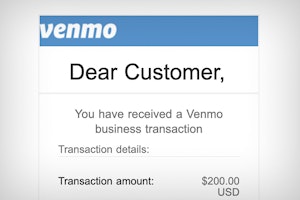
Selling on Facebook Marketplace? Beware of Fake Venmo Emails
Scammers are sending fake Venmo emails to Facebook Marketplace sellers in an attempt to steal login information and money.
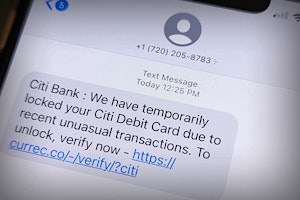
Citibank Text Message Scam: Locked Debit Card Alert Is Fake
If you've received a locked debit card text message from Citibank, it's likely a scam. Don't click on the link and delete the text message.
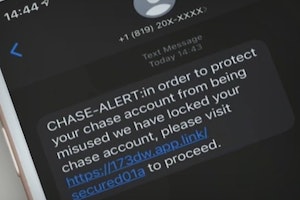
Real Chase Fraud Text Alert or Scam Message?
If you receive a text message from Chase Bank, don't click on any links or call the phone number listed—it could be a scam designed to steal your information and money.
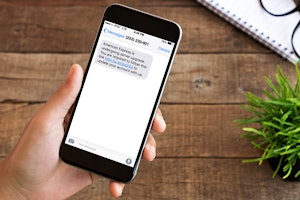
Amex Fraud Text Alert Scams: Spotting a Fraud
If you receive a text message from American Express, don't click on any links or call the phone number listed—it could be a scam designed to steal your information and money.

Fake Verizon Text Messages: How to Avoid a Scam
Verizon may send you text messages from time to time with account updates or data usage alerts, but beware—most of these aren't really from Verizon but scammers.
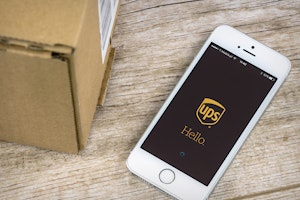
Get an Unexpected Delivery Alert? It May be a UPS Text Scam
Scammers are using SMS messages to send fake alerts to customers regarding a package delivery. Here's what to know about this scam.
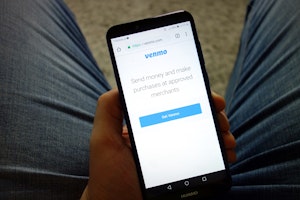
Venmo Text Scam: Don't Fall For These Fake Messages
If you received a text from Venmo with a link to verify a payment or deposit, or are asked to complete a survey in exchange for money, it may be a scam.

Truist Text Alert: How to Identify a Real Text from a Scam
You may think that that Truist have sent you a text alert about your account. Here's how to check if it is actually a scam.
Guides Relating to Bills & Invoices

5 Ways to Avoid Magazine Subscription Scams & How to Subscribe Safely
Magazine subscriptions should be easy. Scammers are everywhere, costing Americans over $300M. We have gathered data from experts to show you who to avoid and who to trust.
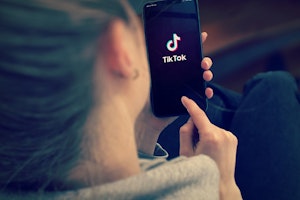
How to Get Verified on TikTok
Securing that little blue checkmark can mean brand collabs, sponsorship opportunities, or protecting your unique content from impersonators.

How to Tell if Nikes Are Fakes: From Tags to the Stitching
Nike is one of the biggest brands targeted by counterfeiters and scammers - be extra careful with Nike products from non-official retailers as you could end up with a fake

Funeral Homes & Prices - What Are The Costs & Your Rights?
Average prices from funeral homes range between $8k to $14k and consumers are meant to be protected by a 'Funeral Rule' - what are your consumer rights?

How to View Your Amazon Archived Orders & Hide Search History
If you share your account with multiple users, archiving your past orders is a good way to keep others from seeing your orders and ruining a surprise or seeing private orders.
News Relating to Bills & Invoices

Founder of Cancer Cure Scheme Arrested on $700,000 Fraud
A Nashville man claimed to have cured cancer and was in trial with Vanderbilt University, but was only interested in stealing a $10,000 deposit from patients to enter trial.

Urgent CDC Warning: Eye Drops Linked to 3 Deaths, Loss of Vision
The CDC is warning eye drops users of a rare bacterial infection from 2 brands of eye drops. The infection is resistant to antibiotics and has resulted in the loss of vision, loss of eyeballs and the death of 3 patients.

Banks May Refund More Zelle Scam Victims in 2023
Zelle scams have reached a serious volume. New reports suggest that banks are looking at new refund protections for customers in 2023.

Optus Data Breach - One of the Worst Cyberattacks in Australia
Hackers have gained access to 9.8 million customer records from Optus in Australia, exposing personal information such as driver licence, medicare and passport details.

Roe vs. Wade Overturned: Abortion Rights in Your State
Find out what the overturning of Roe vs. Wade means for abortion rights in your state.